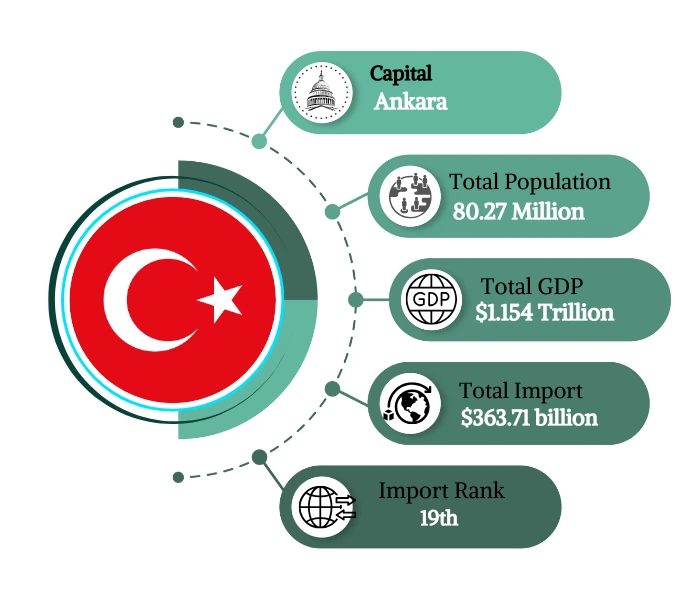turkey importDATA
Accurate & Updated turkey import Data
Utilise our extensive turkey import data to unleash the potential of your company. To propel your performance in the turkey market, acquire insightful knowledge about top commodities, trade possibilities, and top trading partners.
Our turkey Trade Data offers a detailed picture of the trade environment in turkey through carefully selected import data. To find the finest markets and improve your trading tactics, use comprehensive trade data.
Use premium import data from turkey to stay ahead of the competition in the global commerce game. Use trustworthy trade data and insights to guide your decision-making as you expand your company in the turkey market.
The image highlights major global import categories across various industries, showcasing the diverse range of products traded internationally. It reflects the importance of sectors like energy, machinery, technology, healthcare, and luxury goods in global commerce. These categories play a crucial role in shaping international trade dynamics and economic development.

Rank
18
The country has been ranked 18th in global imports, showing a significant position in the international trade landscape and import market.
Share
1.5%
With a mere 1.5% share in global import trade, it becomes evident that its presence in the international import market is fairly on the rise.
Leading Partner
RUSSIA
Russia holds a significant role as the largest import partner of the country in terms of goods imports and import share.
Biggest commodities
MINERAL FUELS AND MINERAL OILS
Mineral fuels and mineral oils are the biggest import commodities of the country, playing a vital role in its economy.
import
Top 10 import of turkey : Detailed import Data by HS Code
Occupying a noteworthy location in international trade, turkey engages effectively in foreign business, with its import serving as the primary engine of growth. As per the available data, turkey top 10 import for the year 2025 included:
- Mineral Fuels and Oils (HS Code 27) – The largest import category, accounting for 19.1% of total imports, valued at approximately $69.11 billion.
- Nuclear Reactors, Boilers, and Machinery (HS Code 84) – Contributing 11.32%, imports in this category totaled around $40.93 billion.
- Precious Metals and Stones (HS Code 71) – This category made up 9.37% of total imports, valued at $33.91 billion.
- Vehicles and Automotive Parts (HS Code 87) – Accounting for 8.92%, Turkey imported $32.25 billion worth of automobiles and related components.
- Electrical Machinery and Equipment (HS Code 85) – Representing 7.69%, with imports worth approximately $27.82 billion.
- Iron and Steel (HS Code 72) – Imports of raw and semi-finished iron and steel reached $24.16 billion, making up 6.68% of total imports.
- Plastics and Plastic Products (HS Code 39) – Representing 4.48%, imports in this category totaled $16.21 billion.
- Organic Chemicals (HS Code 29) – With imports worth $9.17 billion, this category contributed 2.54%.
- Medical, Optical, and Surgical Instruments (HS Code 90) – This segment accounted for 1.78% of total imports, valued at $6.45 billion.
- Aluminum and Aluminum Products (HS Code 76) – Contributing 1.74%, imports in this category reached $6.29 billion.
Exploring the Key Metrics in turkey import Data
We collect reliable and verified trade data from trusted sources, including organizations, shipping companies, government authorities, and customs ports. This trade data covers a wide array of valuable fields such as HS codes, product descriptions, pricing, quantities, origin and destination countries, port names, and currency values. For traders and marketers, this data is a powerful resource that supports well-informed business decisions. Every detail—from product classification and descriptions to the exact volume and cost of goods—is available through this comprehensive trade dataset. To give you a clearer picture, we have provided a sample of this data to help you understand its depth and structure.
turkey import data specifically refers to detailed information on the goods and services exported by the turkey to global markets. It includes essential aspects like commodity type, HS code, export destination, shipment quantity, and transportation mode. This data plays a critical role in tracking global trade movements, guiding policy development, and supporting strategic planning for businesses. Understanding U.S. export data is important for several reasons. It allows businesses to discover new and growing markets, pinpoint export opportunities, and analyze the global competitiveness of U.S. industries. With insights drawn from sector-wise export performance, policymakers and industry leaders can identify strengths and weaknesses and implement strategic initiatives to boost growth and global reach.
Key Advantages of Accessing turkey import
- Export statistics help researchers, analysts, and economists assess the performance and overall health of the turkey economy.
- Generate high-quality leads directly from the turkey import market.
- Stay updated on the latest product demand trends in the turkey import sector.
- Monitor competitor activity and stay ahead in the global trade landscape.
- Build effective marketing strategies backed by accurate import data insights.

Frequently Asked Questions
turkey import data provides detailed information about goods shipped from the import to international destinations. At Cypher Exim, we make this data actionable for businesses aiming to understand global trade trends, identify opportunities, and grow internationally.
You’ll get access to HS codes, product descriptions, export values, shipment volumes, exporting ports, and destination countries—everything you need to track demand, monitor competitors, and make smart trade decisions.
At Cypher Exim, we provide regularly updated data—typically refreshed monthly—so you’re always working with the latest trade intelligence.
Absolutely. Whether you're a startup or a growing exporter, Cypher Exim's import data can help you discover untapped markets, competitive prices, and optimize your logistics and marketing strategies.
Yes! Our platform helps you pinpoint high-potential import markets by showing where specific products are most in demand. With Cypher Exim, you can confidently target regions that align with your trade goals.